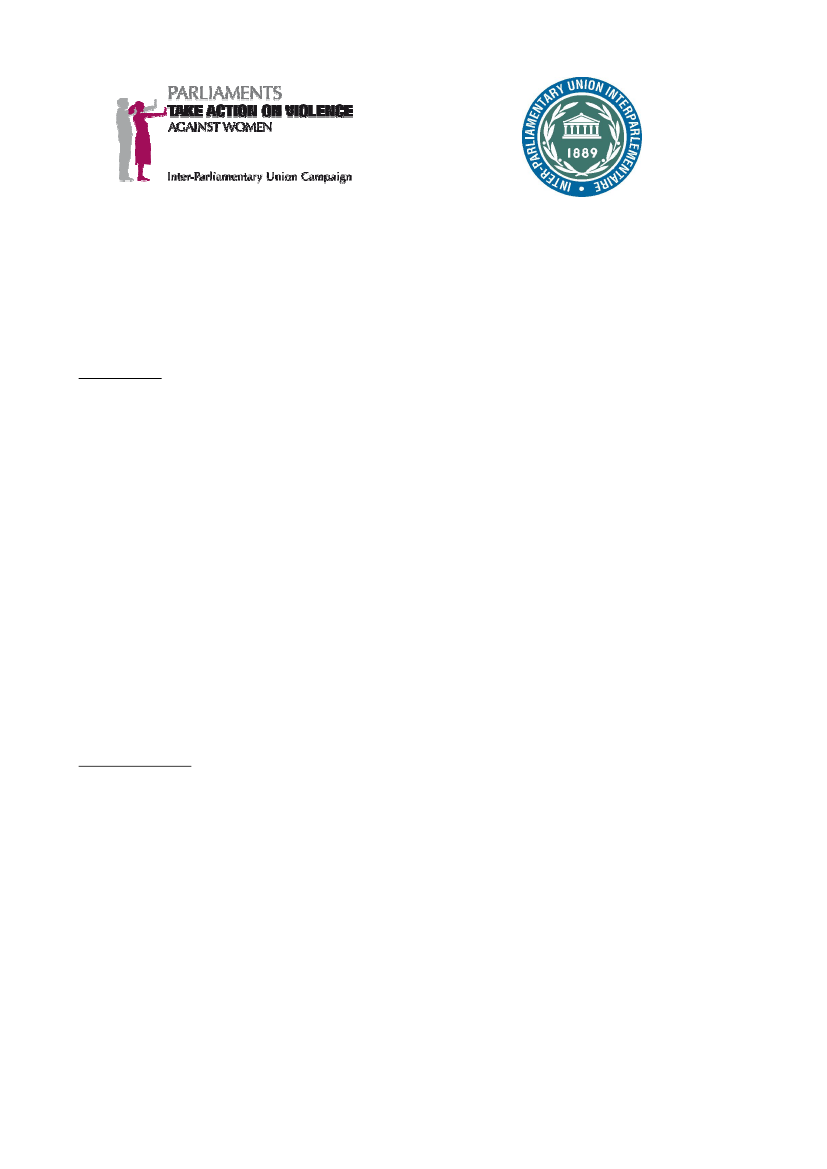Dansk Interparlamentarisk Gruppes bestyrelse 2010-11 (1. samling), Retsudvalget 2010-11 (1. samling), Socialudvalget 2010-11 (1. samling)
IPU Alm.del Bilag 4, REU Alm.del Bilag 57, SOU Alm.del Bilag 60
Offentligt



INTERNATIONAL DAY FORTHE ELIMINATION OF VIOLENCE AGAINST WOMEN25 NOVEMBER 2010Proposal for parliamentsBackgroundViolence against women has reached pandemic proportions: according to available country data, sevenout of 10 women experience sexual and physical violence during their lifetime. No society is immune tosuch violence. It can take on many forms and occurs just about everywhere: domestic violence, sexualabuse of girls at school, sexual harassment in the workplace, early or forced marriage, genital mutilation,sexual assault, rape as a weapon of war, to name the most common. Nowadays, the chances of awoman aged between 15 and 44 years falling victim to domestic violence and rape is higher than therisk of cancer, a road accident or malaria.Some progress has been noted, however. The action of several parliaments has helped make theproblem of violence against women more visible nationally and has made it a priority on the politicalagenda. A growing number of countries have passed laws and devised national action plans to tacklethis problem. But there are still loopholes and much remains to be done to speed up progress andmake a real difference to the lives of women everywhere.We are aware that the response to violence against women must be both comprehensive and adaptedto the reality of each country. It must encompass prevention, protection and assistance for victims, andthe repression of perpetrators. To be effective, action must be based on close collaboration between thevarious stakeholders responsible for preventing and combating violence against women.Proposed themeAgainst this background, and to mark the International Day for the Elimination of Violence againstWomen on 25 November, parliaments are requested to mobilize around the following theme:“Building partnerships to combat violence against women”Why build partnerships?To enhance the participation of all interested parties in the legislative process needed to combatviolence against women;To monitor the enforcement and impact of laws to counter violence against women on theground;To bring about a change in mentality and mobilize public opinion with a view to eliminatinggender-based violence.Working in partnershipwith key stakeholders in preventing and combating violence against womenhelps to:Have a better grasp of the situation on the ground, the stakes involved, and the reality ofwomen who are victims of violence and ensure that the legislative response is adequate;
2Better evaluate the costs of violence against women;Pool resources and knowledge;Better understand what works and what does not work and make the necessary adjustments;Enhance coordination with a view to effective enforcement of legislation.
Who are these stakeholders and potential partners?The following list is by no means exhaustive:National and local authorities: relevant ministries and in particular the health, security, justice,social affairs and women’s affairs ministries and statistics offices that collect and analyse data onthe problem;Mediators and human rights organizations that monitor enforcement of legislation;Victims of violence;Civil society organizations, in particular those that provide shelter and support to the victims ofviolence and groups that reach out to youth and men with a view to preventing violence;Religious and community leaders ;The media, so that they can air the issue of violence against women and advocate zerotolerance;Schools and universities; andThe private sector.Proposed activitiesParliaments may wish to organize on 25 November one of the manyactivities that bring one or morekey stakeholders together,such as:Consultations in parliament or directly with the stakeholders involved on violence againstwomen and national solutions to combat the problem;A special discussion about a relevant bill;A national audit of progress made and difficulties encountered in enforcing the law with thevarious stakeholders involved (magistrates, prosecutors, police service, attorneys, health andsocial services, civil society, etc.);A conference or seminar dedicated to identifying ways of preventing this form of violence;Mobilization of the media through press conferences and radio and television programmes witha panel of key stakeholders.Ideally, these activities should help to develop long-term partnerships.Tools and visibilityA special section of the IPU website has been dedicated to the issue of violence against women:www.ipu.org/vaw. The IPU will list under that section the activities planned by various parliaments tomark the International Day for the Elimination of Violence against Women of which it is informed.These activities will be showcased as contributions to the UN Secretary-General’s campaign UNiTE toEnd Violence against Women on the Say NO-UNiTE website at: http://www.saynotoviolence.orgThe poster and brochure developed for the IPU campaign entitledParliaments take action on violenceagainst womenwill be made available to parliaments upon request. Your parliament can drawinspiration from this material to come up with an activity to mark the Day on 25 November and beyond.For any queries concerning the IPU campaign, please contact Ms. Brigitte Filion, Programme Officer, at:[email protected] or tel.: +41 22 919 41 20.
Inter-Parliamentary Union5, chemin du Pommier
3Case postale 3301218 Grand-SaconnexGeneva, SwitzerlandTel.: +41 22 919 41 50Fax: +41 22 919 41 60e-mail: [email protected]Website: www.ipu.org



